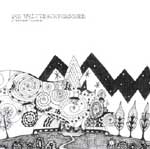|
|
 |
Dusted Reviews
Artist: Die Welttraumforscher Album: 21 Weltraum-Standards Label: Staubgold Review date: Jun. 6, 2005 |

|
|
|
 |
Forget the myth of the bedroom loner-pop satellite: it’s done to death, milked of any frisson of subversion. The inversion of music production hierarchies is so complete now that home recording is the Year-Zero of intervention, and the idea of forming a group to ‘pay dues’ on the (ahem) ‘live circuit’ is as quaint as the Antiques Roadshow. Iconoclastic behaviour has been going on for decades in experimental music circles, with legions of Wasp synthesizers or crabby improv players going direct-to-reel, maintaining mystery by firing music obits into orbit on rudely designed tapes or DIY albums. Nevertheless, for some odd reason, the pop iconoclast still engenders a quiver of autodidact thrill: Ariel Pink is a case in point; predecessors include Jandek, R Stevie Moore, and The Residents. All engage with the outside world to varying degrees, although after the ‘someone’s-rolled-away-the-stone’ shock of Jandek actually performing live, anything is possible.
Which is, I suppose, a roundabout way of saying that these recordings by Christian Pfluger, aka Die Welttraumforscher (which translates as World Dream Researcher), are a whole lot less surprising now than they would have been had you stumbled across his first batch of releases in the mid-1980s. 21 Weltraum-Standards is Staubgold’s brave attempt to pull a bow around his more ‘approachable’ output. Too approachable, sometimes – songs like “Sweet Bird” are saccharine things. It is as fey as a Sarah Records single, but you can’t claim any meta-musical curriculum as an excuse for its feyness because Pfluger stands alone. Cologne-based artists like Mouse on Mars have claimed him as a major influence, and the sugar-sweet melodies of MOM compadres like Schlammpeitziger map nicely onto Pfluger’s terrain. Indeed, the accompanying remix disc, originally released on LP by Felix Kubin (who in some parallel universe probably is Christian Pfluger) features remixes from a clutch of MOM/A-Musik-associated acts and their peers. But no one’s quite like Pfluger.
Individualism is not necessarily the be-all and end-all of good music. Unique music, maybe - and even that’s a huge conceptual leap to make - but good music? 21 Weltraum-Standards has its fair share of charming pop moments; the two best appear as videos: the electric punk blast of “Kip Eulenmeister” and the motoric pop mesmerics of “Weg Zu Dir”. In both videos, you can observe Pfluger in action with band mates, so he is obviously not a hermeticist (though from the repeated use of crop-pattern motifs in the latter video, he probably wants you to think it’s all a bit ‘magical’).
If anything, Staubgold should have included more of Die Welttraumforscher’s less pop side, the squirrelly little miniatures for denatured electronics like “Unter Wasser 2” and “Telefontanz”, and left the earnest folk songs behind. 21 Weltraum-Standards betrays an artist with an impressive range, moving from the aforementioned electronics pieces to squirty electro-pop a la early Eyeless in Gaza, to flitting instrumentals seemingly culled from Komeda soundtracks. If it doesn’t exactly gel, that may well be the point. One would hate to think that an artist could spend 25 years making music to end up in the same place they started.
By Jon Dale
|







